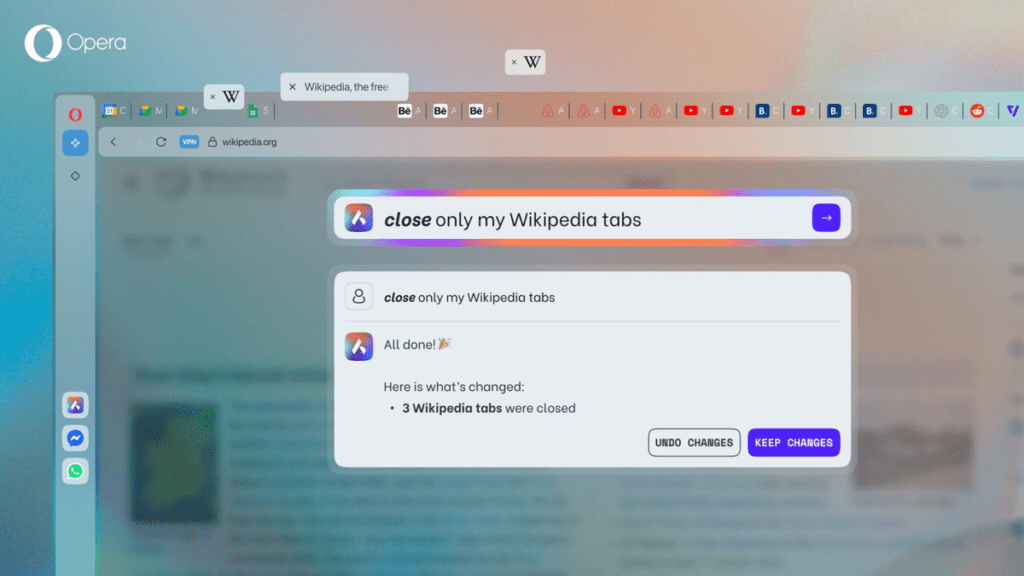- Opera One Web Browser has released a new AI Tab -commands -Function
- The tool allows the Aria AI assistant to manage tabs using natural language recordings
- Users can ask Aria to group, close or organize tabs directly from the command line
Web Browser Opera One offers new hope for those of us with a hundred or more open tabs on a dozen topics. Opera’s new AI Tabs Commands can simply take care of it with some basic prompt.
As the name suggests, the AI tab connects your requests to organize or close tabs in your browser based on the item or site. You may use it to “close all Wikipedia tabs” and watch them all disappear or “group my Techradar tabs” and have all the articles you are happy to read, in a row.
The feature uses Opera’s AI assistant, Aria, to handle the requests. It is a new world for Aria that has been stored in Chatbot form to answer questions so far.
Aria is now an ‘AI agent’ participating in the growing number of AI tools capable of performing tasks instead of just absorbing and sharing information. It complements the more extensive operator agent released earlier this year by Openai.
It is a small change in theory, but one that could feel pretty huge to anyone who has ever found swimming in a sea of semi -read articles, abandoned shopping carts, open spreadsheets and at least one tab playing music you can’t locate.
Aria does not just recognize specific sites; It understands the context. Ask it to group “all my work tabs” and it finds out which tabs you meant. You no longer have to play forensic detective to find out what you were doing before lunch.
You can try AI Tab commands through Opera’s built-in command line. Hit Ctrl + / on Windows or CMD + / on Mac, then write what you want Aria to do with your tabs. If you have five or more tabs open, as too many people do, you can also just right -click one of them and click AI Tab Management from the drop -down menu.
“After being the first to introduce tabs 25 years ago, we continue to improve this core function in the browser,” explained Opera product director Joanna Czajka in a statement. “With this step, we continue to push the limit to what can be achieved with these new technologies in a web browser.”
Look at
Opera’s Ai Crescendo
There is something deeply catartic in relieving your tab anxiety on an AI assistant, such as hiring a virtual Marie Kondo for your digital work area. And if you are concerned about privacy in your browser history, you can relax.
The only information sent to Opera’s servers is the text of your command. The list of open tabs and other details remains unseen on your device. So unless you are strangely explicit in detail about everything you would rather not share in your request, Aria doesn’t know anything about it.
Many opera users are probably very used to the company’s infusion of AI throughout its browser. Over the past few years, the company has gradually rolled new tools for Aria. It includes the aforementioned operator agent, image creation, voice output and bringing Aria to her mobile app.
Aria has also led to other upgrades to go with the AI tab -commands, including a “writing state” that lives in the command line, so users prepare E emails and other content without ever leaving the browser. You can also now interact with Aria directly from a browser tab, not just through the sidebar or command line.
It is part of Opera’s efforts to make Aria feel like a native, integral part of the experience rather than a separate thing you need to remember to use. AI’s training has also been upgraded to offer better answers about shopping, recipes and games.
These more subtle improvements and features all work together to make crossing the Internet more friction -free and may be just the thing for opera to encourage more people to turn to them when they want to go online, or at least when they can’t tolerate the sight of so many tabs spread over their screen.



